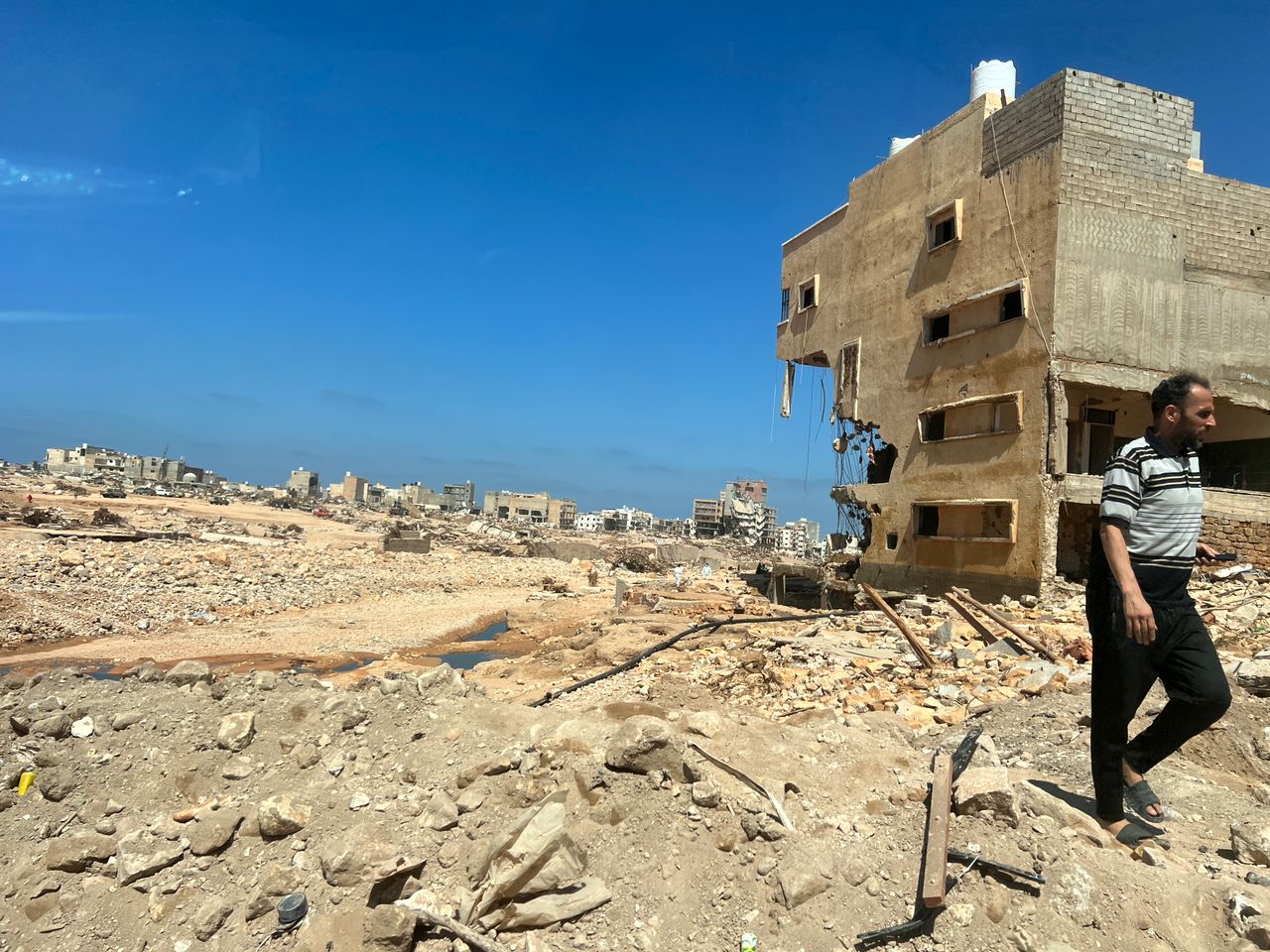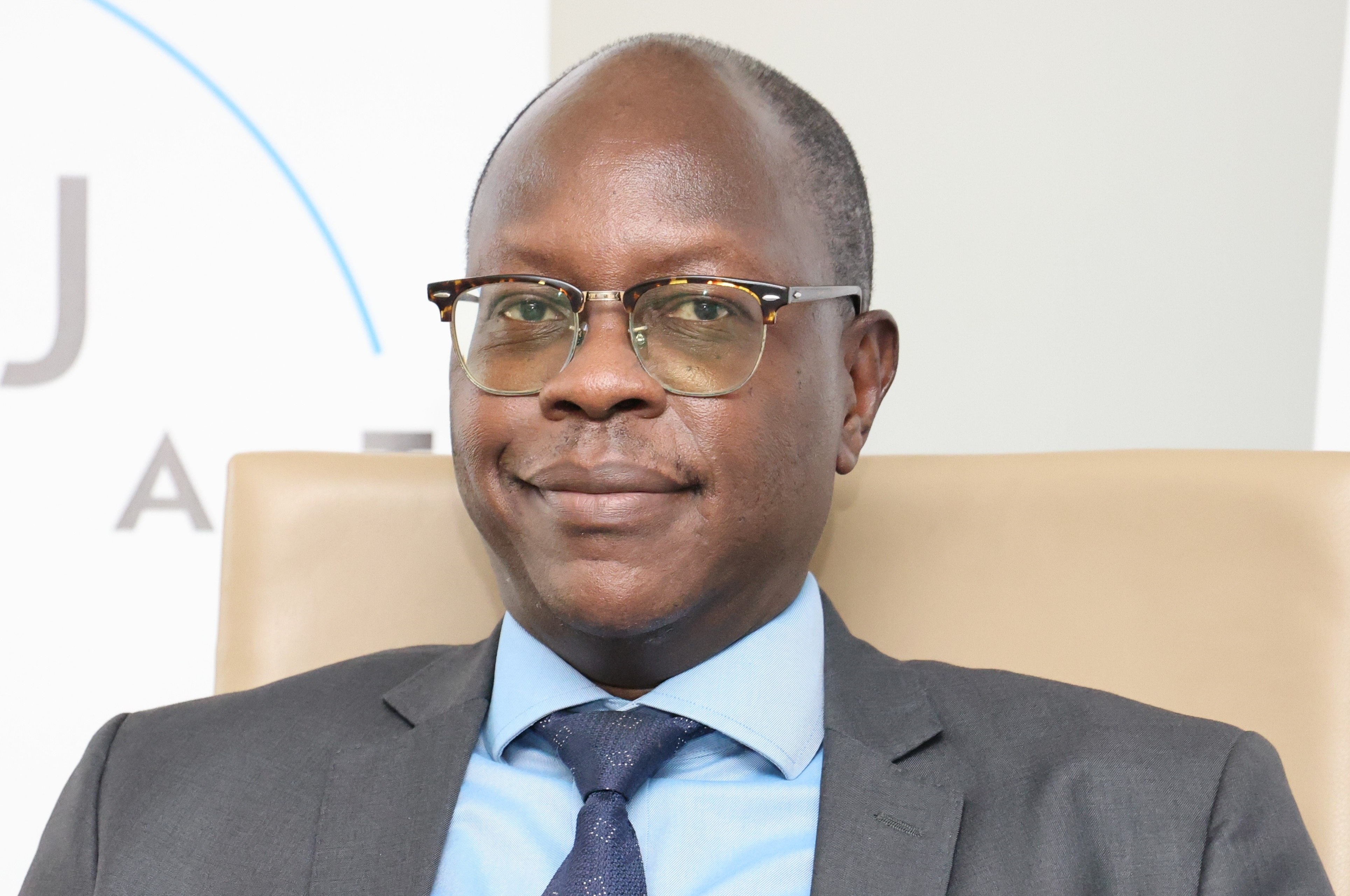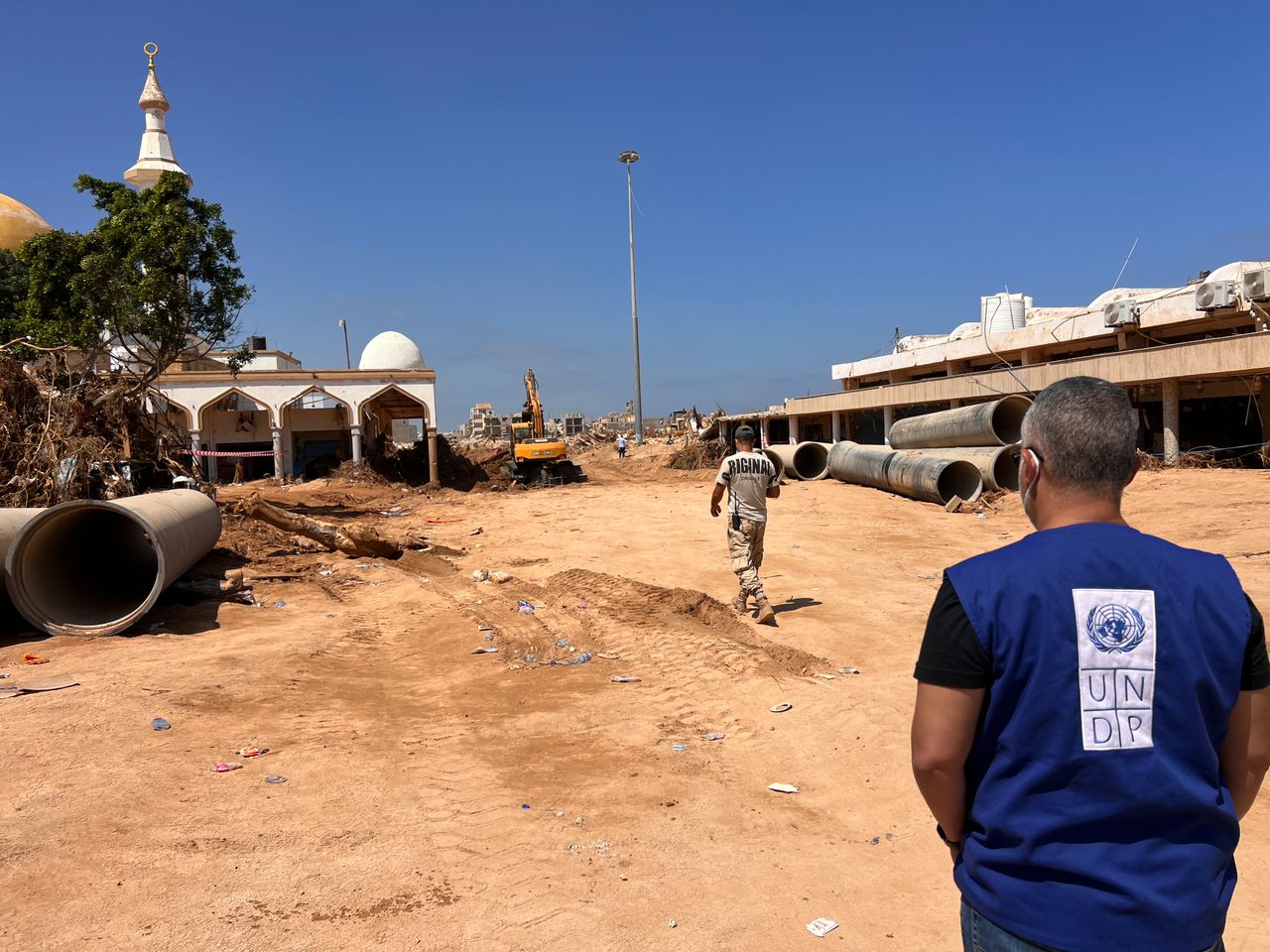A conversation with UNDP Acting Resident Representative Christopher Laker about the devastating floods in Libya
‘Everybody woke up to a different city to the one they went to sleep in the night before’
September 18, 2023

A man walks in front of a damaged building Along with other UN agencies and partners, UNDP is working with Libyan authorities to support communities affected by the floods.
Widespread floods in Derna and Eastern Libya have inflicted immense devastation on local communities, many of which were already vulnerable due to decades of insecurity and conflict. Initial indications point to widespread destruction and physical damage, leaving many affected families vulnerable and in need of urgent help. We spoke with UNDP Resident Representative, a.i., Christopher Laker about the situation on the ground.
What is the situation on the ground following the floods and how have communities been affected?
The floods hit the city at night, so people were sleeping when they heard a loud noise. Water was unleashed from the mountains, and it swept away everything in its path. Buildings and homes were damaged and destroyed and people were washed away. In the morning everybody woke up to a different city to the one they went to sleep in the night before.
Up to 97 percent of some neighbourhoods have been flooded and people have lost their families, their homes, their livelihoods. Access to basic services has been significantly disrupted. Winter is around the corner. How people will be able to cope in the coming days, months and even years ahead is of huge concern.
A few days on and the country is still in emergency mode as the extent of devastation starts to become clear. There are still a lot of unknowns and the initial figures and assessments are constantly evolving, particularly in the badly affected areas like Derna and Benghazi.

Christopher Laker is UNDP's Acting Resident Representative in Libya.
How does UNDP support communities in a crisis situation like this?
UNDP has been working in this region for many years- our staff are embedded in a hub in Benghazi and we also have national staff in the Derna area. All of these colleagues work with the local authorities on a day-to-day basis, planning for delivery of basic services, livelihoods support and social cohesion.
So in the face of this tragedy, we are now working closely with the authorities and with the government to map out how we need to transition that support to help restore the lives of people who have been devastated by the floods, recognizing that development assistance will be needed for many months – and years – to come.
A UN inter-agency mission is also taking place right now in the worst affected areas, and UNDP regional coordinator for the East is part of this assessment. We are primarily focused on access to basic services, emergency livelihoods support, and helping local government to coordinate the crisis response, but will update our support offer when this initial team are back. One major concern is that the affected neighbourhoods, especially in Derna, also housed several of the city's healthcare facilities. Rapid assessments conducted so far indicate that the disruption of city-wide access to healthcare, combined with the likely damage to sewage networks and other sanitation facilities, poses a significant risk of infectious disease outbreaks.
Assessments are still evolving, but the United Nations estimates that the flooding has killed thousands of people and left tens of thousands homeless.
The government has set out three priority areas for the response and has called for international support. First is search and rescue, second is the humanitarian response and then third is ‘return to life’ which will focus on early recovery. This is where UNDP has decades of crisis experience in the region and around the world, supporting removal of debris and rubble, socio-economic assessments and livelihoods support as immediate assistance while planning solution to address the longer-term consequences of the crisis. We have been working with municipalities on local development planning for many years so we have been able to quickly start these discussions and now need to see what is disrupted, what is possible, what is not possible and how we can plan together.
It is vital that these early recovery activities start today, and work hand in hand with the immediate humanitarian response. UNDP plays a crucial role when a crisis strikes: bridging the divide between immediate humanitarian response and the enduring requirements of long-term development.
What was the situation before the floods and how has UNDP been supporting local communities?
These are communities that were already vulnerable. Although progress has been achieved in recent years to help sustain peace in communities, rebuilding trust and enhancing conflict resolution has been a priority.
The impact of the floods – on people’s health, their homes, their access to work, their psychological well-being– will push people’s coping mechanisms to the limit and it is essential that the support is there to help as they take steps to rebuild and recover.
Of all the municipalities that have been affected, Derna is of particular concern. Even before this crisis the needs were high due to poor infrastructure and limited access to basic social services and jobs. UNDP has been working at a local level to inject economic support into communities, through cash grants and livelihoods programmes, but the impact of the floods will put all of these hard-won gains at risk.
Since 2017, UNDP has supported 1.5 million people in 16 municipalities in the East of Libya, restoring trust between citizens and institutions and among communities, and helping the municipality to deliver critical services by restoring markets, schools, health centres, and community roads, with support from international donors.
This is all critical infrastructure, but it is also fundamental to social cohesion, facilitating engagement between different communities in the region. UNDP has been an important bridge in building trust between communities and helping improve safety and security; and this must be a central focus for early recovery. Programmes and interventions must be developed which build on existing efforts to ensure social cohesion and to protect and sustain peace.
Looking ahead, what support will the people of Libya need as they rebuild and recover?
Livelihoods and rehabilitating basic services, especially water infrastructure, are imperative. There is clearly work to be done to understand how the dams have failed and to ensure they are rebuilt safely, which will be a government priority. The government recently launched a master plan for Benghazi and Derna, led by the Construction Fund for Benghazi and Derna, with whom UNDP has been partnering on sanitation activities and the rehabilitation of historic buildings, such as the Al-Manar Palace in Benghazi. In the wake of this devastating disaster, we stand ready to adapt this support, while continuing our focus at a local level on community infrastructure and jobs creation.
We also have a partnership with the water authority board so we can quickly transition to meet the emergency water and sanitation needs.

In Libya and other crisis situations, UNDP aims to bridge the divide between immediate humanitarian response and long-term development.
Over recent years we have also built a strong Local Peacebuilding and Resilience programme that supports local institutions to deliver critical services and promote local economic recovery in the most vulnerable municipalities in the country. Through our networks with partners, we have been able to give small grants to help people start up a business – from bakeries and tea shops to barbers and tailors, as well as supported innovative digital businesses.
Our livelihoods support has helped thousands of people across Libya rebuild their lives, and we must immediately start this work with flood affected communities.
In the past we have carefully planned with the authorities to see where we can bring the most value and this has been very much about providing support in local communities. But now we face a widespread national catastrophe. We need more resources and funding to urgently start up the interventions that are so desperately needed. This will mean ramping up our teams and also ensuring we have the support of international donors.
The needs are huge, and we are committed to supporting the people of Libya and have the networks and country knowledge to do so. Together, we can build forward better.

 Locations
Locations






